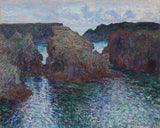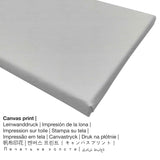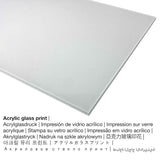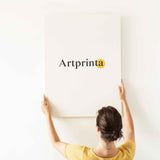Claude Monet, 1886 - Rocks at Port-Goulphar, Belle-Île - fine art print
Tax included. Shipping calculated at checkout.
Summarization of the print product
The painting was made by the male French painter Claude Monet. The 130 year-old artpiece was painted with the size: 66 × 81,8 cm (26 × 32 3/16 in) and was painted on the medium oil on canvas. The artpiece has the following inscription: inscribed lower right: Claude Monet 86. Today, this artwork belongs to the Art Institute Chicago's collection in Chicago, Illinois, United States of America. With courtesy of: Art Institute Chicago (licensed - public domain). Furthermore, the artwork has the following creditline: Gift of Mr. and Mrs. Chauncey B. Borland. Furthermore, alignment is landscape and has a side ratio of 1.2 : 1, which implies that the length is 20% longer than the width. The painter Claude Monet was an artist from France, whose artistic style was mainly Impressionism. The artist was born in the year 1840 in Paris, Ile-de-France, France and deceased at the age of 86 in 1926 in Giverny, Normandie, France.
Pick your preferred product material
For every art print we offer different sizes and materials. Therefore, we allow you to choose among the following options:
- The poster print (canvas material): Our poster is a printed cotton canvas with a slight surface structure. A print poster is perfectly appropriate for framing the art print using a customized frame. Please keep in mind, that depending on the absolute size of the poster print we add a white margin of approximately 2-6cm around the print, which facilitates the framing with your custom frame.
- Aluminium print (aluminium dibond): An Aluminium Dibond print is a material with a true depth, creating a fashionable impression throuch a surface , that is non-reflective. A direct Direct Print on Aluminum Dibond is the ideal start to fine art reproductions with aluminum. The bright & white sections of the original artpiece shimmer with a silky gloss but without glare.
- Canvas: A UV printed canvas material stretched on a wooden stretcher frame. Furthermore, a canvas print creates a lovely, pleasant impression. The great advantage of canvas prints is that they are relatively low in weight. This means, it is easy and straightforward to hang up the Canvas print without any wall-mounts. Hence, canvas prints are suited for all types of walls.
- Acrylic glass print: The print on acrylic glass, often denoted as a an art print on plexiglass, will transform the original into great wall décor. The artwork is being custom-made with the help of modern UV print technology. It creates sharp, vibrant color hues. Our acrylic glass protects your custom fine art print against sunlight and external influences for between 40-60 years.
Legal disclaimer: We try our best to depict the products as accurately as possible and to exhibit them visually in our shop. Nevertheless, the tone of the print products, as well as the imprint might differ marginally from the presentation on your device's screen. Depending on the settings of your screen and the quality of the surface, colors can unfortunately not be printed as realisitcally as the digital version on this website. Given that the art reproductions are processed and printed by hand, there may also be slight deviations in the motif's size and exact position.
The product specs
| Product categorization: | wall art |
| Method of reproduction: | digital reproduction |
| Manufacturing process: | UV direct printing (digital print) |
| Origin of the product: | Germany |
| Stock type: | on demand production |
| Intended usage: | wall décor, gallery wall |
| Artwork orientation: | landscape alignment |
| Side ratio: | length to width 1.2 : 1 |
| Implication of image ratio: | the length is 20% longer than the width |
| Materials available: | acrylic glass print (with real glass coating), metal print (aluminium dibond), canvas print, poster print (canvas paper) |
| Canvas print (canvas on stretcher frame) size options: | 60x50cm - 24x20", 120x100cm - 47x39", 180x150cm - 71x59" |
| Acrylic glass print (with real glass coating) size options: | 60x50cm - 24x20", 120x100cm - 47x39", 180x150cm - 71x59" |
| Poster print (canvas paper) options: | 60x50cm - 24x20", 120x100cm - 47x39" |
| Aluminium print: | 60x50cm - 24x20", 120x100cm - 47x39" |
| Framing of the art copy: | not included |
Structured table of the piece of art
| Name of the painting: | "Rocks at Port-Goulphar, Belle-Île" |
| Artwork categorization: | painting |
| General category: | modern art |
| Period: | 19th century |
| Artpiece year: | 1886 |
| Artwork age: | more than 130 years |
| Original medium of artwork: | oil on canvas |
| Dimensions of the original artwork: | 66 × 81,8 cm (26 × 32 3/16 in) |
| Signature: | inscribed lower right: Claude Monet 86 |
| Museum / location: | Art Institute Chicago |
| Museum location: | Chicago, Illinois, United States of America |
| Museum's web page: | Art Institute Chicago |
| Artwork license: | public domain |
| Courtesy of: | Art Institute Chicago |
| Artwork creditline: | Gift of Mr. and Mrs. Chauncey B. Borland |
Brief overview of the artist
| Artist name: | Claude Monet |
| Alias names: | Monet Claude, Claude Monet, Cl. Monet, Claude Oscar Monet, Monet Oscar-Claude, Monet Claude-Oscar, Monet Oscar Claude, Monet, Monet Claude Jean, מונה קלוד, C. Monet, Mone Klod, Monet Claude Oscar, monet claude, monet c. |
| Gender of the artist: | male |
| Nationality of artist: | French |
| Jobs: | painter |
| Country of origin: | France |
| Artist category: | modern artist |
| Styles: | Impressionism |
| Lifespan: | 86 years |
| Year of birth: | 1840 |
| Born in (place): | Paris, Ile-de-France, France |
| Year of death: | 1926 |
| Place of death: | Giverny, Normandie, France |
This text is intellectual property and protected by copyright © - Artprinta (www.artprinta.com)
Original artwork specifications as provided by the museum (© - Art Institute Chicago - Art Institute Chicago)
Belle-Ile, a small island off the southern shore of Brittany, was known for its dramatic cliffs, rock formations, and grottoes. As he often did, Claude Monet misjudged the time he would need to explore and capture the beauty of the place, which he variously called “lugubrious,” “terrifying,” and “very beautiful.” He came for two weeks and stayed for more than two months. This canvas is one of a group depicting the frieze of rock formations known as Port-Goulphar.














